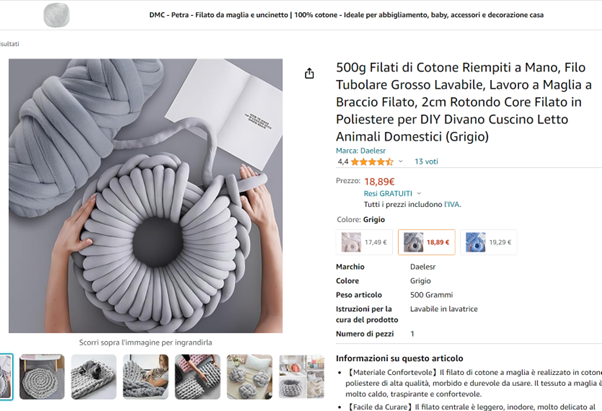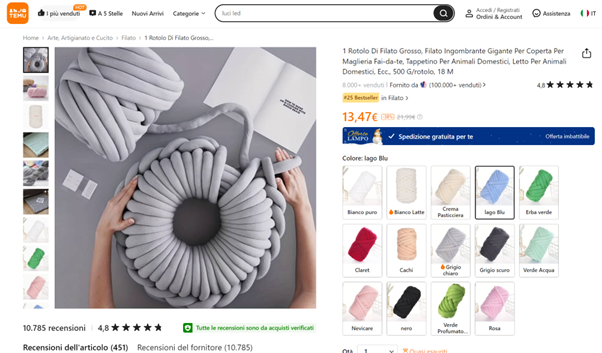In a sea of opportunities offered by online shopping, Temu emerges as a paradise island, inviting for its promises of convenience and with the only disadvantage of a longer wait for packages. However there are potential dangers hidden behind the apparent idyll, making this just the tip of the iceberg of a more complex reality.
The alarm bell: the lack of economic sustainability
Temu’s business model, based on incredibly low prices, seems too good to be true. The losses per order, estimated by Wired, call into question the long-term sustainability of this model. The question arises: how does Temu stay afloat with a seemingly unsustainable economic model?
Imagine being in front of a professional metal razor, with a vintage design and a complete set of Clippers, all at a price that challenges every logic of the market: only € 2.79. According to the announcement, this jewel of shaving technology, which would seem to be aimed at a professional clientele, has collected more than 18 thousand sales and a shower of positive reviews attesting to its quality, confirmed by a rating of 4.5 stars. Intercontinental shipping? Free.

This is the financial puzzle that Temu presents us.
Now, let’s take a step back and reflect: how can such an object, which at first glance does not seem to save on materials and design, be sold at a lower price than a fast food sandwich? Even taking into account mass production and possible discounts for large volumes, the figures seem to escape any traditional economic reasoning.
The offer of free shipping on a product with a low price also raises a further question: how can the international transport costs, often expensive, not be reflected on the final price?
We must remember that buying products that travel across continents involves a high environmental cost. This often overlooked impact must be considered when evaluating the convenience of platforms like Temu. Reality, with a hint of bitter irony, suggests that being sustainable seems almost a luxury reserved for those who don’t have to look down.
It’s a bit like the food scene: if you want to eat only organic foods, rich in nutrients and free of any trace of pesticides or animal derivatives, be prepared to spend a small fortune. Instead, to receive on the fly a tasty Big Mac, just spend a little, but we must not dare to ask how it arrived in the pot!
It seems that sustainability, however desirable, has its price, which is often not sustainable for the wallet.
It is therefore difficult not to be sceptical. Despite the initial enthusiasm that such a deal can generate, it is rational to ask whether behind these bargain prices are hidden compromises often not visible to the eye of the consumer.
The possible answer: the exploitation of user data
Recent research by Grizzly Research has launched a data security alarm in Temu, suggesting that the app could work like spyware. This accusation is particularly alarming considering that the app has failed all the security tests it has undergone. Unauthorised collection of personal data is a real risk, which raises serious questions about user privacy.
Despite the doubts raised, Temu is still available on app stores, and ranks as the most downloaded shopping app in America. This raises questions about the validity of Google Play Store and App Store security controls and the real effectiveness of their mechanisms, even being a Google editor’s choice on Android.

Amazon: a different approach?
Amazon, while being more expensive, seems to offer more guarantees in terms of environmental protection and data security. However, the growing drop-shipping phenomenon complicates the landscape. Many sellers on Amazon actually buy their products from platforms like Temu, making the border between the two more blurred than you might think.
This practice, which is increasingly common, sees sellers on Amazon buying products from platforms like Temu to resell them at a higher price. This makes it difficult for us as consumers to distinguish between products actually supplied by Amazon and those from Temu, leading to an involuntary complicity with the questionable practices of the latter. Or, we simply risk paying more for a product that is actually exactly the same as the Chinese counterpart.
A personal example, due to my research on a product I wanted to buy, is shown in the screenshots below: maybe it is not the same product, but the photo is certainly the same. So how can we discern?

Temu:

We face a difficult choice: compromising our data security and environmental impact for economic savings, or making more expensive but ethically more sustainable choices? And even if we want to choose the second option: how do we do it? Can we really afford it? These are the questions we need to ask ourselves before clicking "Buy Now", although there is no actual answer.
The choice is ours, but we always remember that every purchase is a vote for the type of world in which we choose to live.
Illustration by Gloria Dozio - Acrimònia Studios
.jpg)